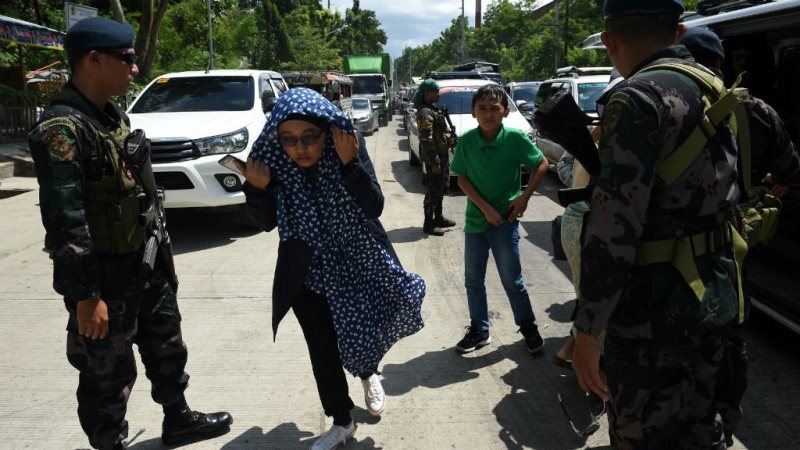Philippine President Rodrigo Duterte declared martial law on 23th May in Marawi city, the Mindanao province a day after the deadly siege of Marawi which claimed by ISIS. Marawi is a mainly Muslim city of about 200,000 people where Moro Muslims live for centuries.
On 10th June, Rappler reported Lawyers in Lanao del Sur Philippine expressed their “severe outrage” over alleged martial law abuses in Marawi over illegal searches and seizures in Marawi City by military men, police, and other law enforcement agencies which result in rampant loss and deprivation of properties and possessions of innocent civilians. The battle has resulted in numerous deaths and triggered a humanitarian crisis in the country. According to the Philippines government, more than 330,000 people have been forced to flee their homes. These mass evacuee Moro Muslims are currently suffering food crisis. Around 475 families fled to government buildings for a month in addition to 1,000 other families living with relatives in nearby towns who are in need of food aid at the end of Ramadan ahead of Idul Fitri.
Moro Muslims inhabit the Sulu and Mindanao islands in southern Philippine which is geopolitically very strategic as the path of world shipping, world trade, and military interests. The location with this profile clearly has invited a lot of attention; many parties want to get involved and to intervene, and this was also fueled by anti-terrorism rhetoric which became a kind of legitimacy for many Western interests to get into this region. To understand what is happening in this region, we need to deepen analysis from two aspects. Firstly, the history of Muslims plight in Southern Philippine and secondly the recent attachment of criminal groups to the label of Islam.
Firstly, we need to understand the history. The prolonged conflict in southern Philippine stems from the rivalry between Islam and the Christian mission in Southeast Asia after the 13th century. In the past, Mindanao was an independent kingdom, then, at the end of the 13th century, Muslims merchants came to the region. Since that time, Islam developed well. By the end of the 14th century, the Islamic Ruler had been established in Mindanao. Meanwhile, Sulu is also an archipelago located in the southern part of the Philippines. This city was a trade route and became one of the political forces of the 15th century. Like Mindanao, Islam entered and grew in Sulu through the Arabs passing through Malacca, Borneo, and the Philippines.
When the Spanish landed in Mindanao and Sulu in 1565, they attacked the Islamic sultanate for up to 350 years. Nevertheless, Spain never succeeded in ruling the Islamic sultanate. After Spain lost the Second World War against the United States in 1898, the Philippines was handed over to the United States. The areas of Mindanao and Sulu that were never controlled by Spain were also handed over to the US. The Muslim people there rebelled against the American occupation and finally on August 20, 1899, the Sultan of Sulu signed a peace agreement with America. But then in 1902, the US created the Moro province that included Mindanao and Sulu. Since then, the territory of the Southern Philippines was directly controlled by Manila. Then until now, as in many predominantly non-Muslim countries, the Moro Muslims had experiencing severe discrimination. Compared to their non-Muslim fellow citizens, they are far behind in their lives. This is because the Philippine government regards them as rebels. Even though the region is the most fertile and richest area with regards to natural resources in the Philippines, the Philippine government has forbidden Muslims to rule in their own territory and control their wealth.
Secondly, we need to reject the attachment of criminal groups to the label of Islam. The criminalization of Muslims struggle against oppression is not something new done by the West under anti-terrorism rhetoric. Groups, like the Abu Sayyaf and Moro National Liberation Front (MNLF), have been blamed and labeled as terrorist for a long time. And recently, the so-called Maute group-inspired by ISIS was legalized inhuman martial law against 330000 Moro Muslims.
Despite the complexity of the Moro Muslim struggle for rebellion in local context, the Muslim Ummah needs to take a stand. We need to unequivocally reject all attachments of criminal acts to Islam because violence, piracy or other criminal acts are clearly forbidden by Islam. Besides, Muslim Ummah should continue to strongly criticize anti-terrorism martial law as a solution for Marawi because this is actually a cheap trick to target Muslim and propagate Islamophobia. Clearly in this Marawi crisis, it is Moro Muslim who become major victims NOT the others. This is exactly the same if we look at wider contexts; Muslims always become unworthy victims almost in every counterterrorism projects globally.
Fika Komara
Member of the Central Media Office of Hizb ut Tahrir
Written for Ar-Rayah Newspaper – Issue 136

